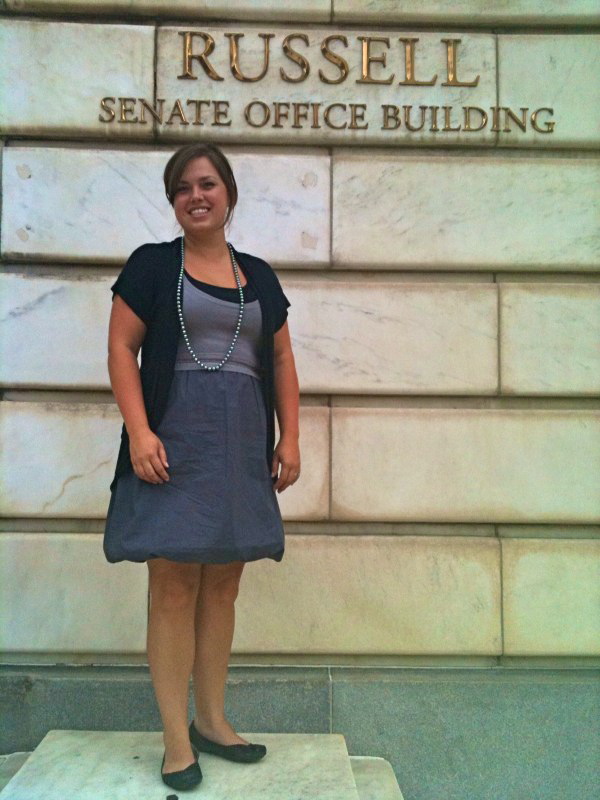June 30th, 2010
Jilleyn Foley, our Faith and Community Partnerships Coordinator, just returned from Bread for the World’s Hunger Justice Leadership Training in Washington, D.C. Because of her personal experiences, Jilleyn is a passionate advocate to fight hunger and food insecurity. As part of our new Spotlight series, Jilleyn shares her story.
Above: Jilleyn lobbied Alabama representatives in D.C.
Growing up in a middle class household, Jilleyn never had to worry about where her next meal would come from – until age 12, when her parents divorced. Suddenly, her mother lost her home and her business (a day care she had been running out of their home) and had to support Jilleyn alone. An educated woman who had once worked as an accountant at Auburn, her mother was now working two jobs: at a fish hatchery in the daytime, and at nights, a bar.
“I never saw her,” recalls Jilleyn. “She was always either working or sleeping.” She moved them across town into government housing, but because she worked so often, she wasn’t eligible for government food assistance. And although her mother worked constantly, they were barely making it. “I don’t know how many times we had ramen noodles,” she recalls, laughing. “We ate them constantly. And just to get this little $2 box of Gushers gummy candy would be so exciting for me because, I mean, we were broke!”
“I didn’t know how bad off we were,” she continues, although clearly “when you’re 12 years old and you live across the street from the projects and your mom is never there, it’s scary.” Her mom was sacrificing her own well being to provide for Jilleyn, even going without food at times. “One time, she passed out because she hadn’t eaten. One minute she was walking down the hallway and the next she was laying on the ground. And I didn’t know – I thought she was dead.” Jilleyn has tears in her eyes and she recalls this painful memory.
Thankfully, someone was there to help. Her aunt came over and realized that her mom wasn’t eating enough. “She bought us groceries. If she hadn’t stepped in, I don’t know what would have happened.” This memory inspires her to this day. “It’s important for people to step in and be a community. Me doing this work is like me being my aunt and stepping in for someone else. We’re never going to end hunger unless everyone steps in as a community to stop this from happening.”
Jilleyn worked for years as a volunteer and a non-profit employee, but it wasn’t until she joined APP that the advocacy light bulb went off. “When we went on a trip to the Black Belt, Kristina helped me realize that organizing a group is more effective than just doing work alone.” Because of her mom’s experience, Jilleyn knows that many working people fall through the cracks of government assistance and are unable to find help. “Advocacy is a way I can help not just one family, but many.”
In D.C., Jilleyn met with Alabama’s congressional representatives and learned how to effectively share her story as an advocate for other children growing up in food insecure households. She believes advocacy can be as simple as sharing your story with others. When Jilleyn and others like her share their stories, policymakers and other community members can start to relate.
In Alabama today, an astonishing 45.4 percent of households headed by a single woman live in poverty. Together, we can advocate for those of our neighbors who are struggling to feed their families.
Tell us – what experience from your life made you care about fighting poverty? In the coming months we’ll spotlight the stories of other Alabamians who have become volunteers, advocates, workers, and donors in the Alabama Possible movement. Will you share your story? Email us with the subject heading “Why I care.”
Posted by Robyn Hyden
